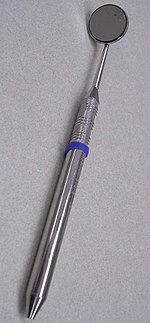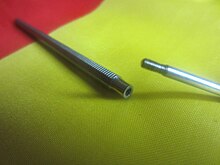Mouth mirror
This article has multiple issues. Please help improve it or discuss these issues on the talk page. (Learn how and when to remove these messages)
|



A mouth mirror or dentist's mirror is an instrument used in dentistry. The head of the mirror is usually round, and the most common sizes used are the No. 4 Ø (18 mm) and No. 5 (Ø 20 mm).[1] A No. 2 is sometimes used when a smaller mirror is needed, such as when working on back teeth with a dental dam in place. The mouth mirror has a wide range of uses. Three of its most important functions are allowing indirect vision by the dentist, reflecting light onto desired surfaces, and retraction of soft tissues. There exists 2 different norms of the thread that are not compatible to each other. The US norm have a taper thread and is mostly used in the United States, Canada, Spain and South Korea.[2]
Indirect vision is needed in certain locations of the mouth where visibility is difficult or impossible. The posterior (or lingual) surfaces of the anterior maxillary teeth is a notable area where mouth mirrors are often used. Other areas of the mouth can be viewed more readily with the mouth mirror, even though it would be possible to see them if the dentist or dental hygienist adjusted their body into a poor position. Without the mouth mirror, poor body positioning would occur daily and lead to chronic postural problems, especially of the back and neck.
There are other areas of the mouth where lighting is difficult, even with overhead dentists' lights. In these instances, the mouth mirror is used to reflect light onto those surfaces. This is especially useful if the mirror is simultaneously being used for indirect vision of an obscure area.
Additionally, the mouth mirror is used to retract tissues, such as the tongue or cheeks, to gain better visualization of the teeth.
Dentist's mirrors are also commonly used by engineers to allow vision in tight spaces and around corners in equipment. They are a common tool in optics and laser labs as well.
References
- ^ Mouth mirror sizes German, English (pdf) Page 247, 248 ff.
- ^ Mouth mirror thread normation Source (German): Daniela Tocan (CC-BY-SA)
- Summit, James B., J. William Robbins, and Richard S. Schwartz. "Fundamentals of Operative Dentistry: A Contemporary Approach." 2nd edition. Carol Stream, Illinois, Quintessence Publishing Co, Inc, 2001. ISBN 0-86715-382-2.
